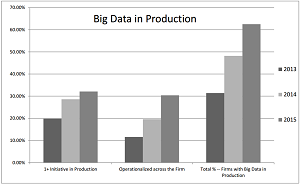News
Enterprise Execs Say Big Data Has Hit Mainstream
In its fourth survey of Big Data decision-makers, NewVantage Partners found the technology has finally hit the enterprise mainstream.
Characterizing its new survey as "anecdotal" rather than "scientific," NewVantage said it sought to capture the voice of enterprise executives who attended its roundtable breakfasts to get feedback on the Big Data phenomenon they are coming to terms with.
The main takeaway? "Big Data has reached a point of mainstream adoption within Fortune 1000 firms," NewVantage said
The management consulting firm said its "Big Data Executive Survey 2016" report will be its last, as the technology has gone mainstream.
"Big Data has achieved mainstream adoption," the company said in a statement today announcing the new survey. "62.5 percent of firms report that they now have at least one instance of Big Data in production. This is nearly double the 31.4 percent who reported the same result in 2013. 26.8 percent of firms report that they will invest greater than $50 million in Big Data by 2017, up from just 5.4 percent of firms that invested greater than $50 million in 2014. 69.6 percent of firms now view Big Data as very important or critical to their business success." Only about 5 percent of polled firms said they have no Big Data programs in place or planned.
NewVantage noted that financial services companies have dominated its survey responses, indicating a strong presence of Big Data analytics in that industry, though life sciences and health care companies are coming on strong and catching up to their financial brethren.
In the four-year span of its Big Data survey, NewVantage has seen an acceptance of a new C-level exec, the Chief Data Officer, which, along with Big Data itself, is now well established in the industry. "In 2012, only 12 percent of firms reported naming a CDO," the company said. "In the 2016 survey, this number jumps to 54 percent. 20 percent of firms now report that the Chief Data Officer is the executive with primary ownership responsibility for Big Data initiatives. 14.3 percent report that the CDO is the primary executive sponsor for Big Data."
 [Click on image for larger view.]
Hitting the Mainstream (source: NewVantage Partners)
[Click on image for larger view.]
Hitting the Mainstream (source: NewVantage Partners)
The main forces driving Big Data analytics implementations are attaining greater insights into business processes and customers, faster answers to questions, faster analytics-based decisions and faster launching of products and services.
To help achieve those goals, the single most important factor is cooperation between the business and technology sides of a business, listed by nearly 34 percent of respondents. "Strong business sponsorship" came in at No. 2, named by about 23 percent of the 44 responding firms.
Finally, the last key finding of the report, NewVantage said, concerned the classic "three Vs" of Big Data analytics, volume, variety and velocity -- that is, the amount of data needing analysis, the variety of forms (text, images and so on) in which it's found and the speed in which it's analyzed.
The study found that respondents viewed variety as the primary concern. "Variety continues to trump volume and velocity as Big Data drivers," NewVantage said. "Firms continue to report that variety is the primary technical driver behind Big Data investments (40.0 percent), with volume (14.5 percent) and velocity (3.6 percent) lagging well behind. Firms are seeking to integrate more sources of data, including new sources as well as legacy sources, as they tap the 'long tail' of Big Data."
NewVantage CEO Randy Bean said the new survey -- described as "an update on the adoption of Big Data in the Fortune 1000," clearly indicates Big Data has arrived.
"Big Data has reached a point of mainstream adoption within Fortune 1000 firms," Bean said. "This survey has over the past four years reflected the evolution of executive perspectives as firms have come to terms with the opportunity represented by Big Data."
About the Author
David Ramel is an editor and writer at Converge 360.